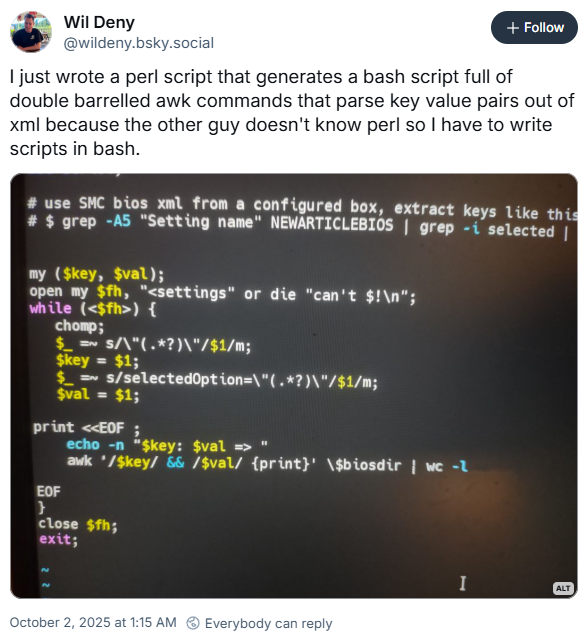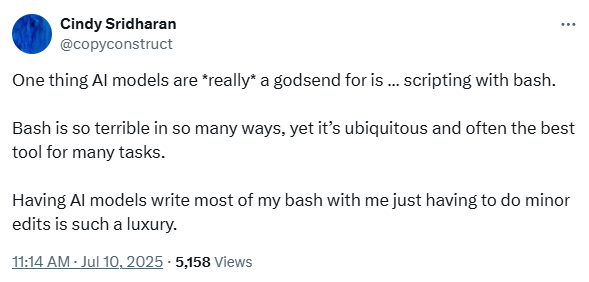Bash is the best tool for the job
Bash is the black sheep of programming languages and yet every backend or DevOps engineer needs to deal with it throughout their career. It is hard to avoid. It’s always available on Linux servers and it’s often the best tool for the job.
Like Bash itself, the things that it is best for are things that programmers need to do but that they habitually avoid. Automation, Continuous Integration, and project infrastructure come to mind as examples where engineers spend the least amount of time that they possibly can. A common thread is that Bash is often the best tool for all of these. It’s the most widely used shell scripting language and is familiar across wide swaths of developer ecosystems.

Yet, Bash is derided as a terrible programming language that is best avoided. Every programmer has complained at least once about unmaintainable shell scripts that were written by some engineer that left the company long ago. They aren’t wrong but Bash scripts aren’t going anywhere either. If anything, the number of situations where they are needed only seems to be increasing. It would behoove us all to give Bash scripts the respect they deserve and maintain them better. In the end, it would make us better programmers.
To Bash or not to Bash
The first thing to learn when setting out to write better Bash is to know when to write it and when not to. Like all programming languages, Bash is good at some things but not others. So while we should aim to write better Bash, we shouldn’t necessarily be writing more Bash.
Bash is best used sparingly for “glue” tasks where you are wrapping or automating the execution of other commands without manipulating much data. It’s often found and used effectively as an embedded language in other files where Bash scripts are written inline. Some examples include GitHub Actions workflows, or Makefiles.
There are no hard and fast rules about when to use Bash and when not to. So it’s a good idea to get a feel for where it’s appropriate. Writing business logic in Bash is typically a red flag, but you might occasionally find Bash to be appropriate for writing scripts of considerable length.
The false promise of POSIX compatibility
One topic that often comes up when writing shell scripts is POSIX compatibility.
This refers to the POSIX
shell (sh) which sets a
kind of minimum standard for Unix shells. Many shells that are available on
*nix systems are POSIX compatible including Bash, Z Shell (zsh), and
KornShell (ksh). Many are not, including tcsh and fish.
The idea of POSIX compatibility is that the scripts that you write will be more portable across systems. This sounds good on paper. Who doesn’t want more compatible shell scripts?
The biggest problem with a POSIX conforming shell script is that the features are extremely limited. This often leads to poorly written and fragile shell scripts as you’re forced to use worse language constructs. If you think Bash scripts are bad, POSIX conforming shell scripts are even worse.
Bash and other shells have extended the POSIX standard shell scripting language
and smoothed over many of its deficiencies (e.g. [[ ]] vs [ ] for
conditionals). So should we write scripts using other shells like zsh or
fish? Using zsh or fish for your terminal shell is mostly a matter of
personal preference. But for scripting, Bash is just going to be better. There
are some nice things about scripting using fish, for example, but they don’t
overcome the advantages of using Bash.
Bash is available almost everywhere a standard POSIX shell is available, so there isn’t a great advantage in portability on modern systems. On relatively modern systems, the upside to using Bash is large and the downside to using it is small when compared to standard POSIX scripting or other shell languages.
Bash is just another programming language
To write better Bash we should be writing it like we do any other programming language. When creating software, Bash scripts too often get special treatment in a programmer’s mind. I think there are a few reasons for that. The main reason is that Bash scripts are most often written for maintenance tasks that don’t contribute directly to new features or revenue streams. For that reason, programmers invest very little time into maintaining and understanding Bash scripts properly.
For something that lives with you for most of your career and causes so many problems, programmers invest surprisingly little time into understanding them. Fundamentally though, Bash scripts, like all languages, benefit greatly from normal software development practices like code reviews, formatters, linters, unit tests, libraries, and improved software architecture. If we write Bash scripts into a single file where everything needs to be reinvented from scratch, has no unit tests, is unreadable with improper indentation, and has easily caught syntax bugs, it’s no wonder everyone hates them.
If we want maintainable software that works reliably, we need to invest the
requisite amount of time in it. There are many tools like
shellcheck for linting,
shfmt for formatting, and
bats for unit tests that can be used
to greatly improve the quality of Bash scripts.
AI can’t save us
Since Bash is a widely used language with lots of example code to train on and no one wants to actually write or maintain it, it’s tempting to have AI write it for us.

The main issue with this is that most bash code, and thus the code the models are trained on, isn’t particularly well written. Poor programming practices are widespread. AI models are also good at making mistakes and require programmers who understand the code to review it.
If we want AI to write better Bash scripts, the only solution is to better understand Bash ourselves.
The payoff
Bash scripts are very powerful tools that have, for decades, consistently been the best tool for the job. They are excellent for integrating different pieces of software and systems together in a low-cost and predictable way.

However, they are often overlooked when thinking about stability and maintainability. While Bash can have rough edges, these edges can be smoothed over if better understood and integrated into already existing software development practices like linting, unit-testing, and code reviews.
Programmers encounter Bash scripts throughout their careers. With only a little effort, we can achieve a really large payoff in stability and maintainability of the software we run every day.
